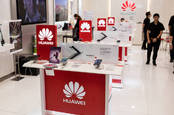This article is more than 1 year old
Huawei claims national security is used as plausible excuse for 'protectionism'
Global government affairs veep wants trade rules to apply
Huawei has told an Australian parliamentary committee it believes national security is sometimes being used to hide protectionist trade policies.
The Chinese comms gear giant made the comments to the Joint Standing Committee on Trade and Investment Growth, which is conducting an inquiry into trade and the digital economy.
Without identifying particular incidents, Huawei's global government affairs veep Simon Lacey said national security should not be “used as a blank cheque to justify or disguise protectionism.”
Lacey told the committee that exceptions to free trade would be better regulated under World Trade Organisation (WTO) rules, so companies could use WTO dispute settlement processes to stop “public policy exceptions” being used to “justify disguised restrictions on international trade”.
In a paper that will soon be published as its submission to the inquiry, Huawei says “governments intervene in the digital economy in a number of ways, both directly and indirectly, in order to achieve a very wide range of – for the most part – perfectly legitimate and commendable policy objectives”.
In that context, the submission calls for “reasonable regulatory objectives” which “do not act as a disguised restriction on international trade”.
USA could follow Australian bans
Huawei's push back against trade bans comes in the context of years of travail in Australia and the USA.
Huawei was barred from bidding to have its kit form part of Australia's National Broadband Network in 2012. More recently the Australian government intervened in a submarine cable project in which Huawei was to build a connection to the Solomon Islands.
Since that cable will land in Australia (as well as Papua New Guinea), the government instructed the Department of Foreign Affairs and Trade to fund local telco Vocus to build it.
Vocus will get AU$2.8 million for a scoping study according to the Australian Broadcasting Corporation. The final cost of the project is not yet known.
In spite of those restrictions, Huawei is part of Australia's 5G working group announced in December.
A similar squeeze could happen in the USA, as we reported last week, with the US Senate considering whether ZTE and Huawei should be shut out of US government contracts.
About the complaint – made most loudly in America – that Huawei is an “arm of the Chinese government”, Lacey told the committee about 30 per cent of the company's manufacturing was in Asia. As well as China, Cambodia and Vietnam are important manufacturing hubs, and both America and Europe each build 30 per cent of its product.
In its submission to the committee, Huawei said nearly everybody in the digital economy is “forced to confront inconsistencies and uncertainties in terms of market access and the treatment we encounter once we have entered a market”. ®

